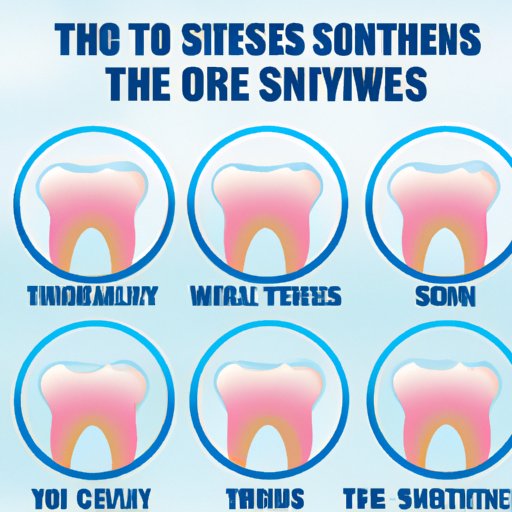Introduction
Have you ever experienced a sharp pain in your teeth when you eat or drink something cold? If so, you are not alone. Tooth sensitivity to cold is a common dental condition that affects millions of people worldwide. Although it is not a life-threatening condition, it can significantly impact your quality of life and cause discomfort and pain.
Understanding the causes of tooth sensitivity to cold is essential for selecting the appropriate treatment and preventing further damage. In this article, we will discuss the top five reasons why your teeth may be sensitive to cold, simple solutions to combat cold sensitivity, the role of enamel in cold tooth sensitivity, the connection between gum recession and sensitive teeth, how to identify tooth sensitivity and prevent further damage, natural remedies to alleviate tooth sensitivity to cold, and diagnosing and treating chronic cold sensitivity in teeth.

The Top 5 Reasons Why Your Teeth are Sensitive to Cold
There are several reasons why your teeth may be sensitive to cold. Let’s explore the top five reasons:
Abrasion of Tooth Enamel
Tooth enamel is the hard, protective outer layer of your teeth. It helps to prevent damage to your teeth from daily wear and tear. However, abrasive toothpaste, too much pressure when brushing, and teeth grinding can wear down enamel, exposing the sensitive dentin underneath, making your teeth more susceptible to cold sensitivity.
Dental Caries or Tooth Decay
Tooth decay, also known as dental caries, is a common dental disease that results from the bacterial breakdown of tooth enamel. When the enamel is damaged, bacteria can penetrate the inner layers of the tooth, leading to tooth decay and cold sensitivity.
Cracked Tooth Syndrome
A cracked tooth can also lead to cold sensitivity. Cracks in teeth can expose the sensitive dentin layer, causing discomfort when exposed to cold. Cracks can be caused by chewing on hard objects, grinding your teeth, or an injury to the mouth.
Grinding or Clenching of Teeth
Grinding or clenching your teeth, also known as bruxism, can damage tooth enamel and cause sensitivity to cold. The pressure caused by grinding or clenching can wear down enamel, exposing the dentin layer.
Acidic Foods and Drinks
Foods and drinks that are high in acid content can erode the enamel, leading to cold sensitivity. Examples of acidic foods and beverages include citrus fruits, soda, and wine.
Simple Solutions to Combat Cold Sensitivity in Teeth
Fortunately, there are several simple solutions to combat cold sensitivity in teeth:
Good Oral Hygiene Practices
Good oral hygiene practices, such as brushing twice a day and flossing daily, can help prevent tooth decay and gum disease, which can lead to cold sensitivity.
Switching to a Soft Toothbrush
Switching to a soft-bristled toothbrush can reduce the risk of enamel abrasion and gum recession.
Using Desensitizing Toothpaste
Desensitizing toothpaste can help alleviate cold sensitivity by blocking the tubules in the dentin that lead to nerve endings in the tooth.
Avoiding Triggers
Avoiding triggers, such as cold drinks and foods, can help prevent cold sensitivity.
Fluoride Treatments
Fluoride treatments can help strengthen enamel and reduce the risk of sensitivity to cold.
The Role of Enamel in Cold Tooth Sensitivity
Definition of Enamel
Enamel is the hard, outermost layer of your teeth that provides protection against daily wear and tear.
Function of Enamel
The function of enamel is to protect the inner layers of the tooth, including the sensitive dentin layer, from damage caused by chewing, biting, and grinding.
Causes of Enamel Erosion
Enamel erosion can be caused by several factors, such as acidic foods and drinks, certain medications, bruxism, and faulty brushing techniques.
Preventing Enamel Erosion
You can prevent enamel erosion by avoiding acidic foods and drinks, using a soft-bristled toothbrush, and practicing good oral hygiene habits.
The Connection Between Gum Recession and Sensitive Teeth
What is Gum Recession?
Gum recession is a condition that occurs when the gum tissue surrounding the teeth pulls back, exposing more of the tooth root.
Causes of Gum Recession
Gum recession can be caused by several factors, such as gum disease, genetics, poor oral hygiene habits, and brushing too hard.
Symptoms of Gum Recession
Symptoms of gum recession include swollen, red, or bleeding gums, tooth sensitivity, and exposed tooth roots.
How Gum Recession Leads to Tooth Sensitivity
When the gum tissue recedes, it exposes the sensitive tooth root, making the tooth more susceptible to cold sensitivity.
How to Identify Tooth Sensitivity and Prevent Further Damage
Common Signs and Symptoms of Tooth Sensitivity
The common signs and symptoms of cold sensitivity include sharp pain or discomfort when exposed to cold drinks or foods, a temporary discomfort when hot or cold food or drinks touch the teeth, and discomfort when brushing or flossing.
When to Visit a Dentist
If you experience persistent tooth sensitivity to cold, you should visit a dentist. Your dentist can identify the underlying cause and recommend appropriate treatment.
Preventing Further Damage to Your Teeth
You can prevent further damage to your teeth by avoiding triggers, such as cold drinks and foods, practicing good oral hygiene habits, and seeking professional treatment for chronic tooth sensitivity.
Natural Remedies to Alleviate Tooth Sensitivity to Cold
Oil Pulling
Oil pulling involves swishing oil, such as coconut or sesame oil, in your mouth for about 20 minutes to reduce bacteria and plaque buildup.
Saltwater Rinse
A saltwater rinse can help reduce inflammation and bacteria in the mouth, reducing the risk of tooth sensitivity.
Clove Oil
Clove oil has natural pain-relieving properties and can help alleviate tooth sensitivity.
Aloe Vera
Aloe vera has anti-inflammatory properties and can help reduce inflammation and pain related to cold tooth sensitivity.
Diagnosing and Treating Chronic Cold Sensitivity in Teeth
When Tooth Sensitivity is Chronic
If your tooth sensitivity persists despite practicing good oral hygiene, you may have chronic cold sensitivity.
Professional Treatment Options
Professional treatment options for chronic cold sensitivity include desensitizing treatments, bonding, fluoride varnish, and root canal therapy.
Endodontic Therapy
Endodontic therapy, also known as a root canal procedure, involves removing damaged or infected tooth pulp to alleviate pain and sensitivity.
Gum Graft Surgery
Gum graft surgery involves taking healthy gum tissue from another part of the mouth and attaching it to the affected area to cover exposed tooth roots and reduce sensitivity.
Conclusion
In conclusion, cold sensitivity in teeth can be caused by several factors, including enamel erosion, dental caries, cracked tooth syndrome, teeth grinding or clenching, and acidic foods and drinks. Good oral hygiene practices, desensitizing toothpaste, fluoride treatments, and avoiding triggers can help alleviate cold sensitivity. Identifying the cause of cold sensitivity and seeking professional treatment when necessary is crucial to prevent further damage. Natural remedies, such as oil pulling, saltwater rinse, clove oil, and aloe vera, can also help alleviate tooth sensitivity. By understanding the causes and treatments for cold sensitivity in teeth, you can improve your dental health and quality of life.
